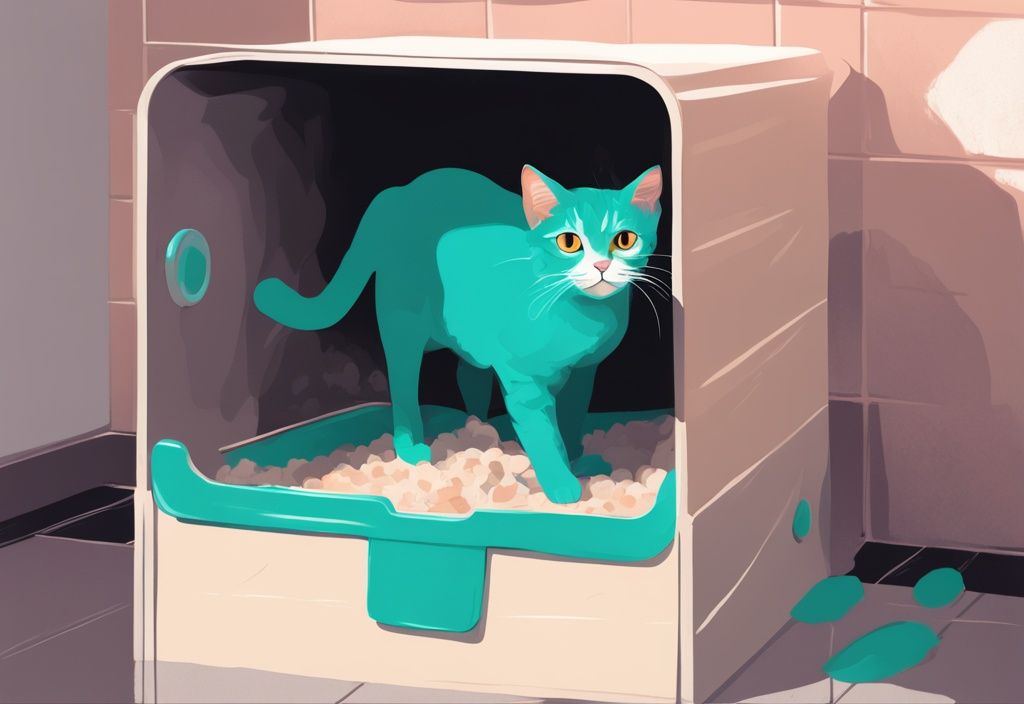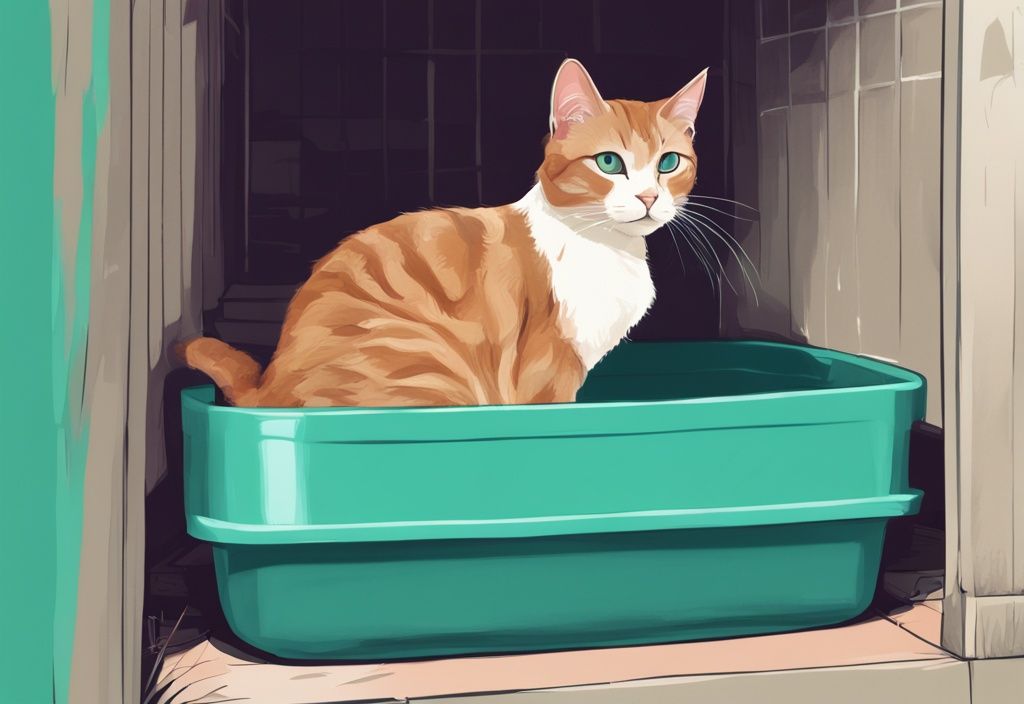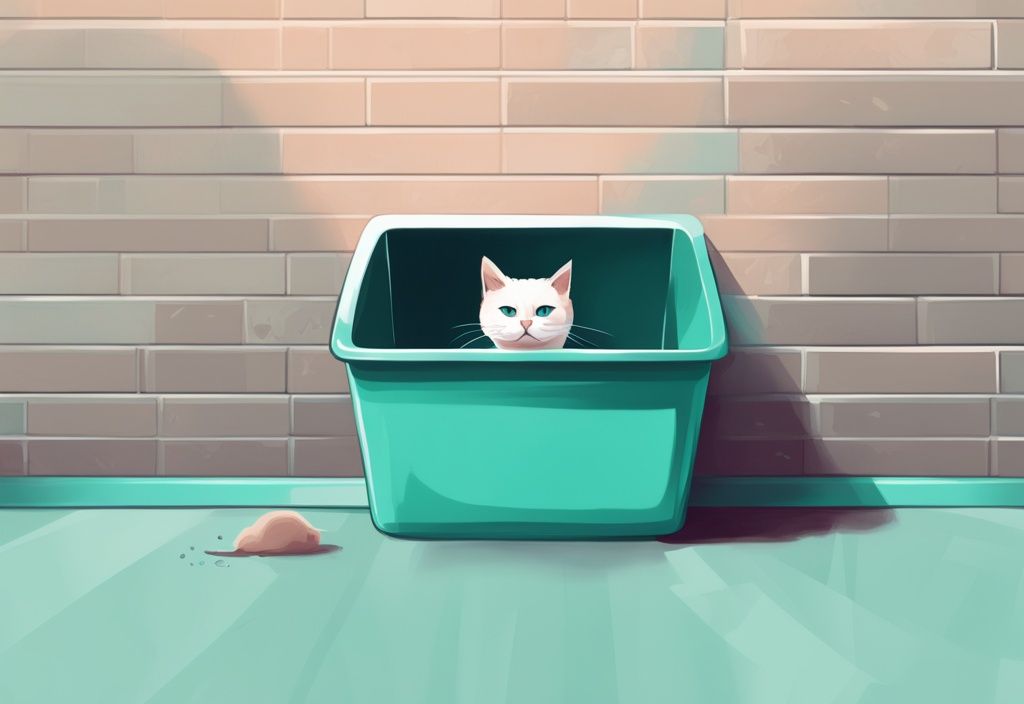Ever wondered why your cat meows in the litter box? It’s a peculiar little quirk that has many of us cat owners scratching our heads. But don’t worry, you’re not alone! It’s a common question that I hear all the time.
This behavior might seem strange, but it’s not as mysterious as you might think. We’re going to unravel this feline enigma together, exploring the environmental, behavioral, and medical factors that could be at play.
So, buckle up, fellow cat lovers! By the end of this guide, you’ll have a better understanding of your furry friend’s behavior, helping you create a happier, healthier environment for your beloved pet.
Understanding Your Cat’s Litter Box Behavior
Cats have their own quirky ways of expressing themselves, don’t they? When a cat meows in the litter box, it might be their version of a chat. Maybe they’re feeling a bit uncomfortable, staking a claim, or just trying to grab your attention. While a little meowing here and there is usually nothing to fret about, if your feline friend is turning it into a concert, it might be time to play detective. Keeping an eye on your cat’s litter box habits can be like having a crystal ball—it helps you catch any changes or health hiccups early on. And hey, if your kitty is showing signs like straining, blood in the urine, or making frequent pit stops at the litter box, it’s time to take action!
Common Reasons for Cat Meowing in the Litter Box
Environmental Factors
Cats, much like my cuddly rescue cat Whiskers, are sensitive souls. Their environment can really shape their behavior. A litter box that’s seen better days might just be the reason behind your cat’s vocal protests. Switching up the litter type, box size, or even the amount of litter can throw them off their game. And don’t forget about location, location, location! A quiet, cozy spot away from the hustle and bustle is ideal. In homes with multiple cats, having enough litter boxes—one per cat plus a bonus box—can help keep the peace and prevent any territorial tiffs.
Behavioral Factors
Sometimes, cats meow in the litter box because they’ve learned it gets them a treat or two. Clever, right? Stress from changes in their environment or routine can also set off this behavior. While some cats just love to chat, if the meowing is non-stop, it’s a good idea to check for any underlying issues.
Medical Issues That Cause Cats to Meow in the Litter Box
Urinary Tract Problems
Urinary tract troubles are a top reason for a cat meowing in the litter box. Feline Lower Urinary Tract Disease (FLUTD) can make potty time painful, leading to those plaintive meows. And while less common, Urinary Tract Infections (UTIs) can cause similar woes. Feline Idiopathic Cystitis (FIC), often stress-related, is another FLUTD culprit. Bladder stones? While addressing these issues, it’s also important to consider other health concerns such as cat hernias, which can sometimes contribute to a cat’s discomfort. Ouch! They can cause pain and inflammation, prompting your cat to vocalize. If your male cat is straining without success, it could be a urinary obstruction—a medical emergency that needs immediate attention.
Gastrointestinal Issues
Constipation can also have your cat meowing in the litter box. Look out for signs like straining, tiny hard stools, and a tense tummy. Things like dehydration, intestinal blockages, and other health issues can contribute to this uncomfortable situation.
Other Health Concerns
Cats with kidney disease might meow more, including in the litter box. Hyperthyroidism can also ramp up the vocalization. And our older feline friends might meow due to arthritis or cognitive dysfunction syndrome (CDS), which can lead to confusion and anxiety.
Understanding Your Cat’s Litter Box Behavior
Have you ever wondered why your cat meows in the litter box? As a fellow pet lover, I can tell you that this quirky behavior is often a cat’s way of communicating. Whether it’s a call for attention, a sign of discomfort, or just a territorial claim, these vocalizations are your feline friend’s way of talking to you. It’s like when my Border Collie, Max, barks at the mailman—there’s always a reason behind those sounds!
Now, let’s dive into the nitty-gritty. If your cat’s meowing in the litter box is sporadic, it’s usually nothing to worry about. But if it becomes a regular opera, it might be time to investigate further. Could it be a health issue or just a quirky habit? Knowing the difference is key to keeping your kitty content.
Keep an eye on your cat’s litter box habits. Just like I keep tabs on Whiskers’ antics, you should monitor any changes in behavior. A sudden shift might be your cat’s way of waving a red flag. Early detection of unusual behavior can be a game-changer, helping you nip potential health problems in the bud.
And here’s a tip: if your cat’s meowing in the litter box is paired with other signs of distress—like straining, blood in the urine, or frequent but unproductive trips—it’s time to call the vet. These symptoms are like a neon sign flashing “Help!” Understanding these cues can ensure your furry friend stays healthy and happy.
Common Reasons for Cat Meowing in the Litter Box
Ever wondered why your feline friend is serenading you from the litter box? Cats, those mysterious creatures, often have their reasons, and understanding them can make both your lives a little more harmonious. Let’s dive into some of the common causes behind this quirky behavior.
Environmental Factors
Cats are creatures of habit, and any disruption to their environment can lead to vocal expressions of discontent. One common reason a cat meows in the litter box is due to an unclean environment. A dirty litter box can be quite displeasing to a cat, prompting them to vocalize their dissatisfaction. Additionally, changes in the type of litter, the size of the litter box, or the amount of litter used can also cause discomfort, leading to meowing.

The placement of the litter box is another crucial factor. Cats prefer quiet, private spaces, so placing the litter box in a noisy, drafty, or high-traffic area can make them uncomfortable and result in vocal protests. In households with multiple cats, it’s essential to provide enough litter boxes—ideally one per cat plus an extra—to prevent territorial disputes and ensure each cat feels secure.
Behavioral Factors
Behavioral reasons can also explain why a cat meows in the litter box. Some cats may have learned to associate using the litter box with receiving a reward, such as a treat, and will meow expectantly. Stress is another significant factor; changes in the environment or routine can lead to anxiety, causing a cat to meow while using the litter box.
While some cats are naturally more vocal, persistent meowing should not be ignored, as it may indicate an underlying issue. Understanding these behavioral cues is vital for addressing the reasons behind a cat’s vocalization in the litter box and ensuring their comfort and well-being.
Medical Issues That Cause Cats to Meow in the Litter Box
Ever wondered why your cat might be serenading you from the litter box? It’s not just a quirky habit. There could be underlying medical reasons for this vocal performance. Let’s explore some of the common health issues that might lead to a cat meowing in the litter box.
Urinary Tract Problems
Ah, the infamous urinary tract troubles! Cats often meow in the litter box because something’s not quite right down there. One of the usual suspects is Feline Lower Urinary Tract Disease (FLUTD). Imagine trying to use the bathroom while feeling like you’re sitting on a cactus—ouch! This condition can cause pain and irritation during urination.
Though less common, Urinary Tract Infections (UTIs) can mimic FLUTD, leading to similar distress. And then there’s Feline Idiopathic Cystitis (FIC), often stress-related, which can turn your kitty into a vocal virtuoso. Bladder stones? They’re like tiny, unwelcome guests causing inflammation and pain, prompting those litter box meows.
In more severe cases, especially for our male feline friends, a urinary obstruction can occur. This is a medical emergency, folks! For pet owners keen on maintaining their pet’s overall health, exploring the best antifungal dog shampoos can be beneficial. It’s like trying to squeeze through a locked door—straining and vocalizing without any luck. Not fun at all!
Gastrointestinal Issues
Let’s talk about another reason your cat might be meowing in the litter box: gastrointestinal issues. Constipation is a frequent culprit here, causing discomfort and, you guessed it, vocalization. Have you ever tried to pass a small, hard stool? Not pleasant, right? Cats feel the same way.
Various factors can lead to constipation, such as dehydration, intestinal blockages, or other underlying medical conditions. These issues can turn the litter box into a less-than-pleasant experience, prompting your feline friend to express their discomfort through meowing.
Other Health Concerns
But wait, there’s more! Several other health concerns might cause your cat to meow in the litter box. Cats with kidney disease often experience increased vocalization, including during litter box use. It’s like their way of saying, “Hey, something’s not right here!”
Then there’s hyperthyroidism, a condition that can lead to excessive meowing as it affects a cat’s metabolism and behavior. And let’s not forget our elderly feline companions. They might meow due to arthritis or cognitive dysfunction syndrome (CDS), which can cause confusion and anxiety. These health issues can make the litter box a source of distress, leading to increased vocalization.
Behavioral and Environmental Factors Affecting Litter Box Use
When it comes to our feline friends, their litter box habits can tell us a lot about their well-being. Whether it’s a sudden meow from the litter box or a change in usage, these behaviors can be influenced by a variety of factors. Let’s explore some of the key reasons why a cat might meow in the litter box and how we can help them feel more comfortable.
Stress and Anxiety
Oh, the drama of a cat’s life! Just like us, cats can get stressed out, and it often shows in their litter box behavior. Picture this: Whiskers, my cuddly rescue cat, once moved with me to a new home and decided the litter box was his stage for expressing all sorts of feelings. When a cat meows in the litter box, it might be their way of seeking comfort or saying, “Hey, something’s not right here!”

Environmental changes, like a new home, a new pet, or even a shift in daily routines, can send a cat’s stress levels soaring. And what do stressed cats do? They meow, sometimes right from the litter box! Keeping their environment stable and predictable can work wonders in calming their nerves and reducing that litter box chatter.
Litter Box Preferences
Cats are the ultimate divas when it comes to their litter box preferences. If Whiskers could talk, he’d probably have a list of demands! When a cat meows in the litter box, it might just be their way of saying, “This litter isn’t up to my standards!”
From the texture and scent of the litter to the size and cleanliness of the box, cats have their quirks. Some might prefer a sandy feel, while others are all about that fresh scent. And don’t even get me started on the importance of a quiet, accessible spot for their throne! Regular cleaning and a bit of attention to their preferences can make a world of difference.
By tuning into these little details, we can create a more harmonious environment for our feline companions. This not only keeps them happy but also reduces the likelihood of those mysterious meows echoing from the litter box. After all, a happy cat means a happy home!
When to Seek Veterinary Help for Your Cat’s Litter Box Meowing
Understanding why your cat meows in the litter box is crucial, as it can be a sign of underlying health issues. This section delves into the symptoms to watch for and the steps a vet might take to help your feline friend.
Identifying Symptoms of Concern
So, your cat meows in the litter box like it’s auditioning for a feline opera? While it might seem cute at first, persistent meowing can hint at something more serious. If your kitty’s serenade is joined by weight loss or a sudden change in appetite, it’s time to grab your keys and head to the vet. Timing is everything—does the meowing start before, during, or after the litter box visit? Each scenario tells a different story. Meowing before could mean your cat is anxious or just really excited about its bathroom break. During or after? That might be discomfort talking. Keep an eye on these patterns, as they hold the clues to unraveling the mystery.
Diagnostic Procedures and Treatments
When you bring your cat to the vet for its litter box meowing, the detective work begins! The vet might start with a physical exam, followed by some tests like bloodwork or a urinalysis—think of it as a health check-up for your furball. Depending on what they find, the treatment could be as simple as a new diet or as involved as medication for pain or infection. Sometimes, just like us humans, cats need a little therapy to manage stress or anxiety. Each treatment plan is as unique as your cat, ensuring the best approach to get that litter box meowing under control.
Preventing Excessive Meowing in the Litter Box
Ever wondered why your cat meows in the litter box? It might be their quirky way of telling you something’s up! Let’s dive into some friendly tips to keep those meows to a minimum and your kitty purring with contentment.
Regular Veterinary Check-ups
Picture this: a world where your feline friend is as healthy as a horse (or maybe a Border Collie like my Max!). Regular vet visits are like little health check-ins that can catch any sneaky issues causing your cat to meow in the litter box. Think of it as a spa day for your kitty, where the vet can do a full health assessment, run some tests, and give you all the tips to keep your furball in tip-top shape.
Have you noticed any changes in your cat’s litter box habits? Keeping an eye on these can be a real game-changer, prompting timely vet visits. Catching things early means minor hiccups won’t turn into big problems. Who wouldn’t want that peace of mind?
Maintaining a Stress-Free Environment
Creating a zen den for your cat is key to reducing those litter box meows. Cats are like little furry divas—they love a clean, serene space. Make sure their litter box is spotless and tucked away in a quiet corner. It’s like giving them their own little sanctuary!
Ever tried changing litter types or box sizes? Cats can be quite particular about these things. Respecting their preferences can make all the difference. Plus, sticking to a consistent routine helps keep stress levels down. A relaxed cat is a happy cat, and a happy cat means fewer meows echoing from the litter box.

Remember, a calm environment not only curbs unwanted behavior but also strengthens the bond between you and your whiskered companion. And who knows, maybe your kitty will repay you with a few extra cuddles!
FAQs: Answering Your Questions About Cat Meowing in the Litter Box
Ever wondered why your feline friend might be vocalizing in such a peculiar place? Let’s dive into some common questions to unravel the mystery of the cat meows in the litter box and see what Whiskers might be trying to tell you.
Why does my cat meow before using the litter box?
Picture this: Whiskers, with her tail high, prances towards the litter box and lets out a little meow. Is she excited? Perhaps! Cats often meow before using the litter box as a way to express anticipation or even a bit of excitement. But, just like Max gets chatty before his walk, it could also mean she’s feeling a tad uncomfortable or is simply craving some attention. Keep an eye on her behavior, and you might just crack the code!
Is it normal for my cat to meow in the litter box occasionally?
Oh, absolutely! Just like how Max barks at the mailman, an occasional meow in the litter box is quite normal for cats. However, if Whiskers starts a meowing symphony every time she visits, it might be time for a vet check-up to rule out any underlying issues.
What should I do if my cat meows in the litter box and seems in pain?
If Whiskers is meowing and looks uncomfortable, it’s crucial to seek veterinary advice. Watch out for other signs like straining or any unusual changes, such as blood in the urine. These signals are like red flags waving for immediate attention.
How can I reduce my cat’s stress related to litter box use?
Creating a serene litter box environment is key! Try placing the box in a quiet, cozy corner of your home. Keeping a consistent routine and avoiding sudden changes can help Whiskers feel more secure and relaxed. Think of it like setting up a spa retreat for your cat!
Conclusion
Ah, the curious case of a cat meowing in the litter box! As a pet owner, understanding why your feline friend might be doing this is like unlocking a little mystery. This quirky behavior could be your cat’s way of saying, “Hey, something’s up!”—whether it’s discomfort, stress, or a health issue.
Imagine this: you’re sipping your morning coffee, and suddenly, Whiskers starts serenading you from the litter box. What could it mean? By tuning into these vocal cues, you can spot changes in your cat’s health or environment that might need a bit of attention.
Regularly keeping an eye on your cat’s litter box habits is like being a detective in your own home. Notice any changes in behavior or frequency? These could be early signs of health issues. A proactive approach, much like Max’s enthusiasm for chasing his tail, ensures your cat stays happy and healthy.
And let’s not forget the importance of those vet visits! They’re like a wellness check for your furry pal. Regular check-ups can uncover hidden medical conditions that might cause your cat to meow in the litter box. By combining your keen observations with professional veterinary care, you can make sure your feline companion lives a life full of purrs and snuggles.
So, next time your cat meows in the litter box, remember: it’s not just noise; it’s a conversation waiting to happen. Embrace the journey of understanding your pet, and you’ll both grow together in the most delightful ways.
